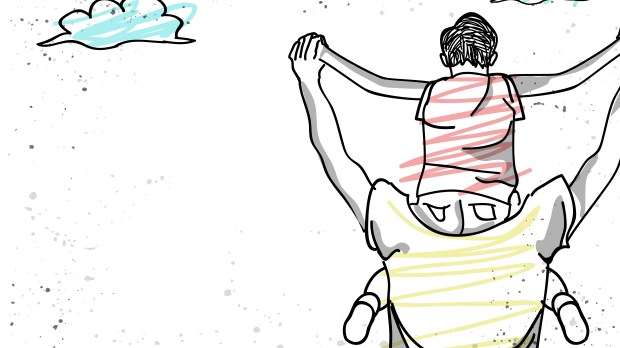There is a recurring story in the work of American author Paul Auster about a skier who gets lost in the French Alps and is swallowed by an avalanche. Rescue efforts fail to recover his body. Some 20 or 25 years later, his son — who was just a boy when his father died and also became a skier — sets out on an expedition in the same region. Alone on the mountain, miles and miles away from any other human being, he comes across his father’s body. It’s in perfect condition because it has been encapsulated in ice. What strikes the narrator most is the fact that the son is older than his father was.
In my interpretation, the narrative symbolizes how the young man has to continue his trek across the ice and mountains alone, taking steps in life that his father never took, because he never made it that far. Having outlived his father—having lived later and longer—the son feels alone, distressed at having to find his own way without the path marked by his father’s skis.
Father-son relationship
As I see it, this story is an analogy of the deep influence that a father can exert on his children as a reference point for their lives. I think it even influences our difficulty in reevaluating our values and overcoming outdated paradigms. Many times, when I rethink certain attitudes, deep down I notice some remnants of the formation I received from my father. Overcoming some things we learned from our fathers is equivalent to creating our own tracks on untouched snow.
This may help explain why we always need our father’s approval. In order to move forward, we need constant proof that we’re on the right track. This explains why I continue to send my father, as I have for more than 15 years now, all the writings I publish in magazines, newspapers and books. Approaching the age of 40, I still want his recognition and approval.
Paternal presence
More than that, I realize how much of my father is present in who I am and in my worldview. “My pain is to realize that despite having done everything we’ve done, we’re still the same and we live like our parents,” Antonio Belchior wrote in the lyrics of Como Nossos Pais, immortalized by Elis Regina in 1976.
Psychoanalyst Jen Laplanche wrote a book, Hölderlin and the Question of the Father (1961), in which the French intellectual analyzes the life and work of Friedrich Hölderlin (1770-1843)—a lyric poet with a rebellious and philosophical spirit who helped update the thought of classical antiquity—from the point of view of the influence of the father figure on his life and work. Laplanche points to Hölderlin’s moments of rupture with his father as fundamental to his finding of his voice and his vocation, as well as his conclusions based on reinterpretations of established thought.
Learning
In other words, the German poet only learned to “ski with his own legs” from the moment he was willing to let go of the comfort represented by the values he’d received from his parents. In my opinion, this is something we should all assimilate. We should understand parental support and guidelines as an initial push. It’s up to us to learn from them and try to adjust their role in our life as we climb toward the top of the mountain, which never stays the same.
Our parents have walked a path before us. That doesn’t mean that we can’t continue that path in our own way.



